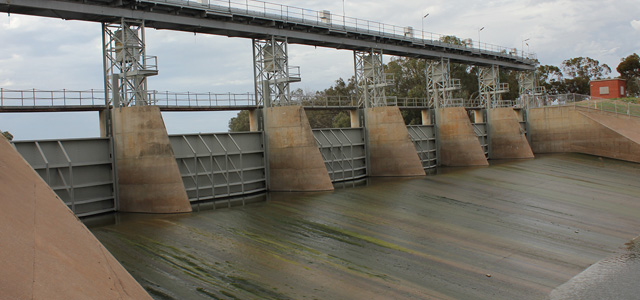In the second of our four-part series about The Murray Darling Basin, the pastoral visit learns more about the area’s complicated history and the personal impact of sharing faith.
The Menindee Lakes lie in northern NSW near Broken Hill. People living downstream are facing a serious water shortage, with the Darling River almost entirely dry between Menindee and Wentworth. Many in this community blame over-extraction of water by irrigators upstream, and the Government’s inequitable management of the system.
Water flow through the lower Darling River is highly regulated and managed by the NSW Government under the Murray Darling Basin Plan. The naturally occurring chain of Menindee Lakes was modified in the 1950s and 1960s. Weirs and dams, levees and channels were built to improve its storage capacity for the environment, farming, irrigation, recreation, mining, as well as water supply of Broken Hill (and to manage Darling River floods).
Before the Menindee Lakes Storage Scheme, the lakes filled naturally during periods of high rainfall and retreated to form a series of smaller pools. The weir at Menindee Lakes can be filled to 128 per cent of their capacity, forming the main storage for the Darling System. But evaporation rates are high. At times, as is the present situation, the lakes dry out.
Almost empty now, the lakes were last full was in 2012. The annual flow in the Darling River also has been reduced dramatically, due to water demands in the upper catchments of the Barwon–Darling river system. Queensland’s Cubbie Station, the largest irrigation property in the Southern Hemisphere, sits at the headwaters of the Murray-Darling river system. Its thirst is unquenchable.
The weir at Menindee
The cost of selling water
Managing all these water ways is a complex issue with many competing demands. Thousands of kilometres of rivers weave through four states, one territory, and diverse communities damaged by the water management process. Some are near breaking point.
Paul Creek has lived all his life in the Riverina. He runs a livestock and grain farm near Lockhart and is our guide for the pastoral visit. Creek explains how people selling their water licenses have put more pressure on the river system. “A lot of the landholders in the Murray Darling Basin originally got a water license with their property so, in times of drought, they had security and could draw water out of the river.”
“The irrigators began to complain they weren’t using their water allocations, so they argued they should be given up,” says Paul. “Landowners fought this for a long time because it was their insurance for dry times.
“In the 1990s the government separated water from land title which meant people were allowed to sell the water separately from the land. The people who were not using the water decided to sell the licenses and, in return, get money for them. Over the past 30 years this increased the demand on the river. The people who purchased licenses wanted to make sure they used every bit of their allocation.”
Community groups are trying to tackle the water issues. At Coleambally on the first night of the pastoral visit, we met with the Faith in the Basin Future Reference Committee. This Uniting Church initiative was formed to give hope to local communities through the voice of people under 35 years of age, developing community projects around future and sustainability.
Jacqui Pasquale and The Moderator, Rev. Myung Hwa Park
‘Heartened’ by sharing faith
The next day we cross the Hay Plains and follow the Murrumbidgee River to Gol Gol to meet with Jacqui Pasquale, a local Uniting Church member. Distances are vast. Cotton is the main crop on the plains and herds of cattle are spread out across dry, clay soil.
Pasquale and her family have farmed along the Darling River for several generations.
Their farm is located near the junction of the Murray and Darling Rivers at Wentworth where water is pushed back up the Darling via a weir. However, not far enough for the Pasquale’s farm, which virtually has no water. Water has become a commodity, explains Pasquale. “When water is seen as an economic resource rather than a living thing, then people respond and behave differently.”
Several options have been floated to resolve the crisis situation but it seems no-one in the community can agree. One option is to build a pipeline next to the Darling but locals don’t want to see a pipeline as the only option. Buying back the water licenses from irrigators has also been floated. What is agreed, though, is the water flow must be restored, and a clear process and solution developed that is equitable and sustainable.
Pasquale is “heartened” by the Moderator travelling to NSW’s far west to hear from those along the river. “Her warm community-centred approach is valued and appreciated during a time when I and my family felt a little cut adrift and without agency,” says Jacqui. “It’s a very concrete way of reaching out and sharing our faith.”
PART 3: The river of the people
Show your support
- Churches and individuals can support the people of the Lower Darling by contributing to the Synod Disaster Fund
- To register for the annual Murray Darling Basin Tour in September 2016, click here
- Click here to email any other enquiries about the Murray Darling Basin Tour







2 thoughts on “Storage schemes, broken streams”
The UCA has first hand experience now of adverse consequences from water trading, and the capacity of states to divert water or allow trading. Justified by the doctrine of added value, as part of wealth and growth, water no longer attaches directly to land. But without water, the productive and strategic value of land drops. There are problems with hydrology and the social environment which a pipeline may in part solve, such as removing evaporation losses and increasing livability for the settled population. I think the immense cost of pipelines, environmentally, socially and financially, my be justified, but the doctrine of growth and added value we must question, even oppose. The Tim Jackson 2009 book Prosperity Without Growth examines these in detail. But for the UCA for one, human worth and environmental value are absolute values arising from God’s creation. We may not just sell things just because there is a buyer. It is time for the UCA to speak for the sovereignty of the land and its people. It is not ours to do with as we like.
In a broader sense, the UCA needs to move forward in dealing with the political implications of major population changes, global warming and the carbon economy. The debate on measures to remedy these three has become acute to the point that commitments by the state adversely to their remedy needs our urgent attention.